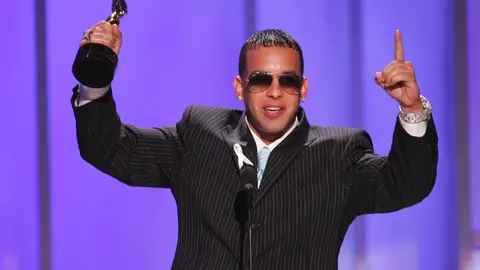15 Years Ago, Daddy Yankee's 'Barrio Fino' Set The Template For Reggaeton's Big Rise

By Lucas Villa
When Puerto Rican reggaetonero Daddy Yankee hopped on Luis Fonsi's 2017-conquering hit "Despacito," the pair kicked off a historic run. The song topped the Billboard Hot 100 chart for a record-tying 16 weeks (with some help from Justin Bieber) and is often credited for sparking the Latin-music explosion in pop that continues to thrive today thanks to vibrant artists like Bad Bunny, J Balvin, and more. But "Despacito" was hardly the beginning for Daddy Yankee, who laid the groundwork for the genre's big breakthrough 15 years ago with the release of his album Barrio Fino in July 2004. Superstars in his wake like Ozuna, Maluma, Bunny, and Balvin were able to rise up after Barrio Fino's biggest hit "Gasolina" (which charted at No. 32) warmed up the world to reggaeton music. "Gasolina" wasn't just the fuel; the song also lit the fuse for the larger música urbana movement that's still blazing brightly.
Daddy Yankee, born Ramón Luis Ayala Rodríguez, spent the '90s and early 2000s getting his name out in the Latin-music industry alongside fellow Puerto Rican rappers like Tego Calderón, Don Omar, and Ivy Queen, now known as the queen of reggaeton. He released his first album, No Mercy, in 1995, and grew his audience with subsequent releases like his El Cartel compilations and 2002's El Cangri.com. Reggaeton connected at home in Puerto Rico and later with Latinx audiences in the U.S., but the rest of the world took notice when Daddy Yankee dropped his third album, Barrio Fino, in 2004. Loaded onto the record are hits built for perreo, a dance with Puerto Rican origins that involves lots of grinding, like "Lo Que Pasó, Pasó," "No Me Dejes Solo," and the Glory-featuring "Gasolina," which became ubiquitous.
"Gasolina," Spanish for gasoline, became a worldwide hit. The dembow-riding banger pulled off a rare feat for a fully Spanish-language song at the time by peaking at No. 32 on Billboard's all-genre Hot 100 chart and at No. 5 on the U.K. singles chart. The music video features Daddy Yankee at a drag-race track, and little did the OG reggaetonero know that he would be behind the wheel of his genre's international victory lap. As Salute magazine noted last year, the lyrics in "Gasolina" were simple and repetitive, but made it something that people could connect with whether or not they knew Spanish. "I think the song was so popular because there was a lot of different meanings for the song," Daddy Yankee told Rolling Stone. Naturally, its rhythms also helped this dance song become a universal club staple.
Colombian superstar Shakira, who was previously known for her more rock-leaning releases in Spanish, changed lanes in 2005 for the Fijación Oral, Vol. 1 album and with the reggaeton-influenced "La Tortura," featuring Spanish singer Alejandro Sanz. "La Tortura" climbed to an impressive No. 23 on the Hot 100 chart while "Gasolina" was making similar moves. To highlight the undeniable popularity of reggaeton, the 2005 MTV Video Music Awards invited Shakira and Sanz to perform their hit live. That night, MTV also made history as Omar, Caulderón, and Daddy Yankee performed their biggest hits together, marking the first time that Spanish-language songs were performed at the VMAs.
As the 2000s gave way to the 2010s, Latin music on a global scale hit a valley as EDM and empowerment pop both reached their own stratospheric heights. But Daddy Yankee helped the genre reach a new peak in 2017 alongside fellow Puerto Rican singer Fonsi with the "Despacito" remix featuring Bieber that shattered more records for a mostly Spanish-language song. It became the first Latin song since Los Del Rio's "Macarena (Bayside Boys Mix)" in 1996 to top the Hot 100 chart. Since then, the new generation of reggaetoneros have landed more hits in Spanish — J Balvin's "Mi Gente," the "Te Boté" remix with Ozuna, and Maluma's "Felices Los 4" all made appearances on the chart. As reggaeton music rides again, música urbana has become more of a force with other subgenres like Latin trap, and traperos like Puerto Rico's Bad Bunny and Anuel AA are scaling the same charts.
As one of the vanguards in reggaeton music, Daddy Yankee remains a power player in the genre. He recently outpaced the success of "Gasolina" with his latest hit, "Con Calma," featuring Canadian rapper Snow and Katy Perry, which reached No. 22 on the Hot 100 chart. He's still got that gasolina to get going and isn't slowing down anytime soon.
In February, Daddy Yankee performed his biggest hits with contemporaries like Puerto Rico's De La Ghetto, Zion y Lennox, and Yandel alongside J Balvin and Ozuna at the Premios Lo Nuestro awards. The medley was an early celebration of Barrio Fino's 15th anniversary. After saluting Daddy Yankee and reggaeton's beginnings on last year's hit "Reggaeton," for the grand finale, J Balvin performed "Gasolina" with his hero in one of the live tribute's best moments.
Following the performance, J Balvin presented Daddy Yankee with the honorary La Trayectoria award and said to him in Spanish, "Without Daddy Yankee, there wouldn't have been reggaeton in the world. J Balvin would not exist if it weren't for Daddy Yankee." Daddy Yankee then spoke about how far the genre has come since Barrio Fino's breakthrough: "Our genre has grown because there is a union. There is a brotherhood."





